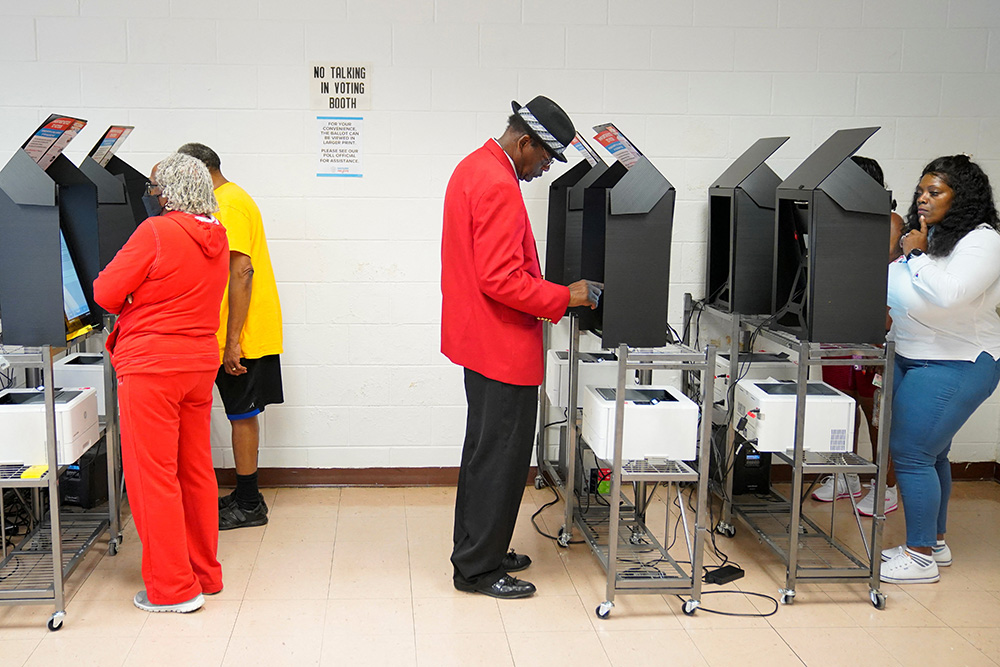
People cast their ballots at the Citizens Service Center in Columbus, Georgia, Oct. 17, in early voting for the midterm elections. On Dec. 6, Georgia is holding a runoff for the U.S. Senate seat. (CNS/Reuters/Cheney Orr)
As the character Thomas More says in the play "A Man for All Seasons," "The maxim is 'Qui tacet consentiret': the maxim of the law is 'Silence gives consent.' If therefore you wish to construe what my silence betokened, you must construe that I consented, not that I denied," we see that Republican leaders have been silent after former President Donald Trump explicitly called for the "termination" of the U.S. Constitution. This is astonishing and somehow unsurprising at the same time. And Trump dominates another weekend news cycle.
Today, Georgia holds its runoff for the U.S. Senate seat, in which Sen. Raphael Warnock faces a challenge from former Georgia running back Herschel Walker. It is not always that "Saturday Night Live" has the best analysis, but in this bizarre case, their cold open last Saturday was the best political commentary I have seen. It is appropriately brutal and Kenan Thompson is, as ever, brilliant.
The Democrats have their own problems. Deciding to squash the Iowa caucus' role as the first-in-the-nation presidential contest every four years, weeks after selecting two residents of New York City to lead the congressional chambers, does not exactly send the signal that Democrats want to win in Middle America. What is more, South Carolina is home to one of the last real political machines: Rep. Jim Clyburn runs the Democratic Party there the way Richard Daley used to run Chicago. Clyburn's support for President Joe Biden in 2020 was crucial, so this is a fine reward. However, Iowa was the state that made Barack Obama's campaign viable, proving a Black man could win in a state with mostly white voters.
At the "Go, Rebuild My House" blog on church reform published by Sacred Heart University, professor Brian Stiltner writes about taking some students to a Black Baptist church service and how they reacted. The importance of a well-prepared sermon that connects the Scripture with real-life issues, as well as a welcoming congregation, was among the things the students valued. They mentioned the service was "energetic" and they liked it. When was the last time you went to a Catholic Mass and that was an adjective that came to mind?
Advertisement
The Boston College School of Theology and Ministry is hosting a webinar on synodality Wednesday. It will feature Richard Coll, who is the lead staff person on synodality at the U.S. bishops' conference; Boston College theology professor Rafael Luciani, who was part of the drafting team at Frascati, Italy; and Maureen O'Connell from LaSalle University. A great lineup. Make sure to register in advance!
At Inkstick, Georgetown University's Eli McCarthy reports on the work of nonviolent activists in Ukraine to frustrate the Russian attack, and calls on the U.S. to support them. Putin's war demonstrates the ongoing value of just war theory, but that does not mean those committed to pacifism cannot play a role in defeating the invasion. All Ukrainian hands on deck!
At The New York Times, University of North Carolina historian Molly Worthen argues in favor of oral examinations for students, rather than written ones. She recalls that Socrates "grilled Meno on the nature of virtue." Worthen makes a strong case, and she is absolutely correct to criticize "frequent low-stakes mini-assignments." There needs to be more rigor in our undergraduate formation.






